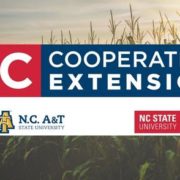Cooperative Extension with Jamon Glover: Bedtime Problems Pt. 1
Jamon Glover, on the Vance County Cooperative Extension Report:
We learn on how to work with children who have problems at bedtime, such as not wanting to sleep in their bed, in addition to other obstacles at bedtime.
Listen live at 100.1 FM / 1450 AM / or on the live stream at WIZS.com at 11:50 a.m. Mon, Tues & Thurs.
Click Play!



